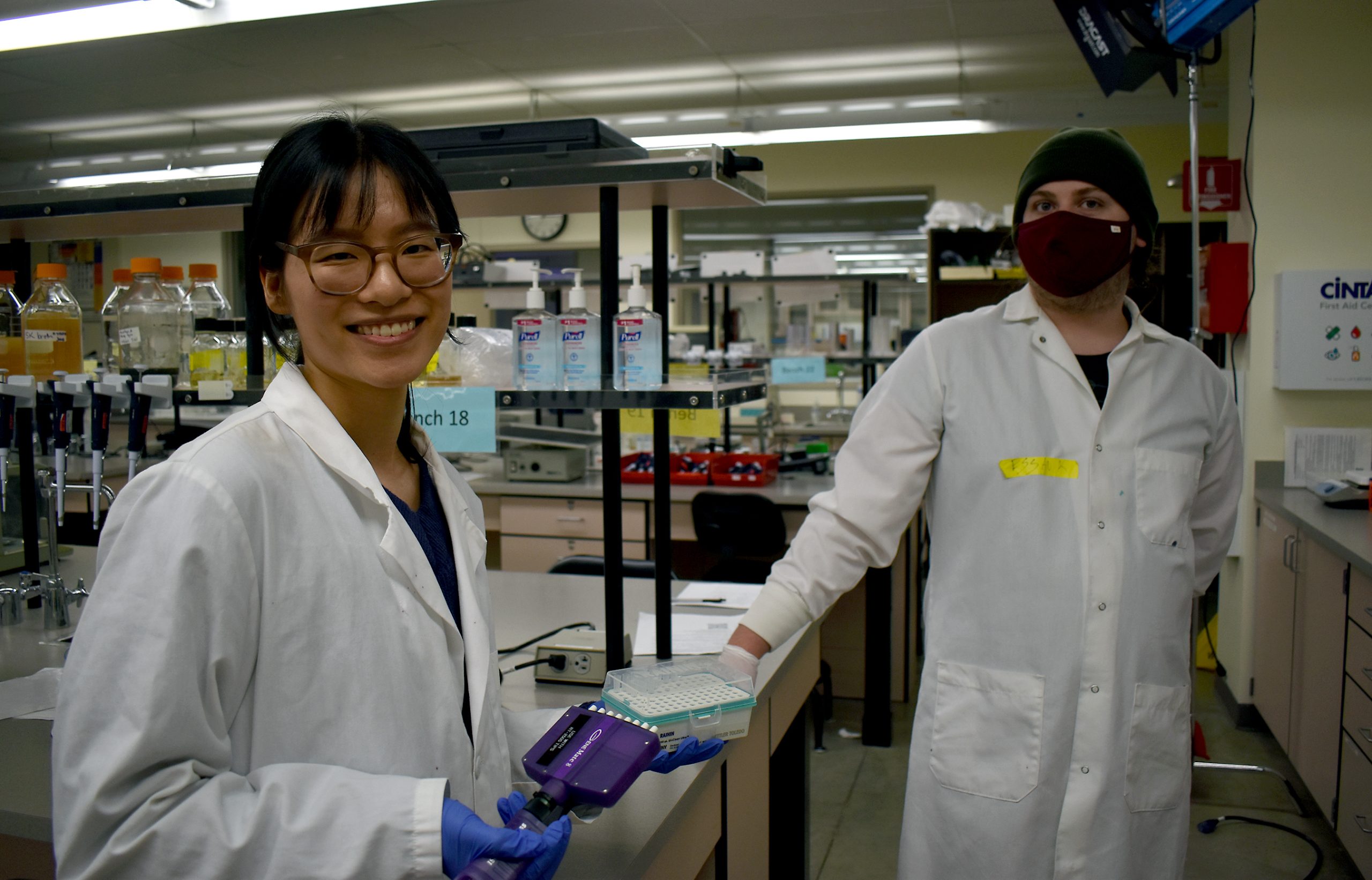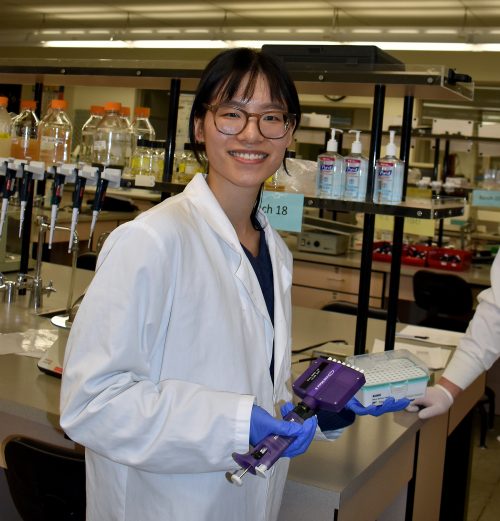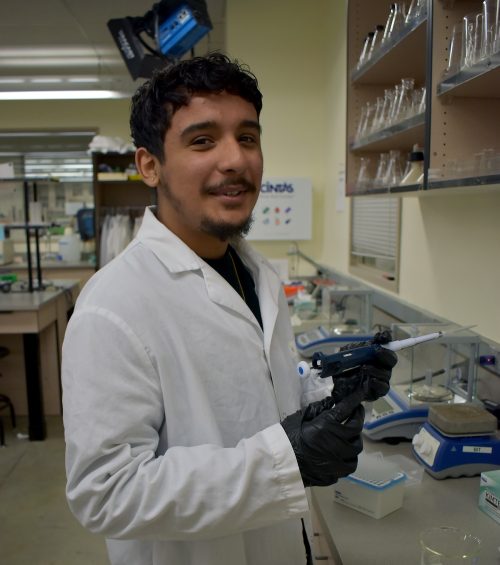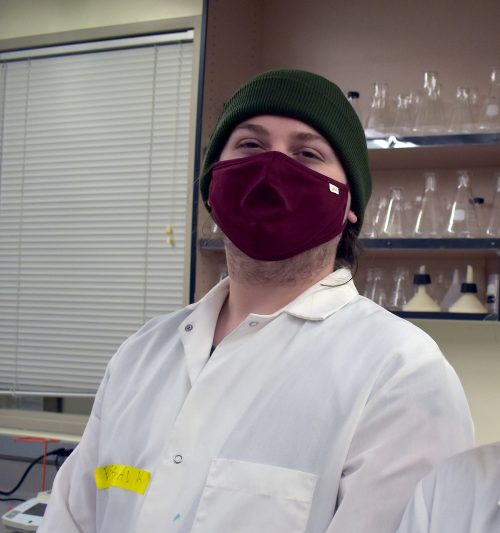This content was published: January 25, 2023. Phone numbers, email addresses, and other information may have changed.
Bioscience Technology Program producing Oregon’s future scientists
Photos and Story by Misty Bouse

Academic Pathways: Science & Engineering
- The Bioscience Technology Program is a growing and dynamic field that applies science and technology to living organisms to produce a wide variety of products and services. The program is part of the Science & Engineering academic pathway, which consists of programs that lead to great careers or provide valuable science class credit, which will transfer to a university.
Bioscience Technology students on Portland Community College’s Rock Creek Campus in Washington County are examples of the scientists who will better Oregon’s future. These future bioscience graduates are continuing their discovery in a wide range of industries and applications like biopharmaceuticals, cancer research, human genetics, agricultural-biotech products and infectious disease solutions. It is these students who support and drive the next level of science.
“Recent advances in biotechnology are helping us prepare for and meet society’s most pressing challenges,” said Josh Cary, Bioscience Technology Program chair. “The bioscience industry is growing quickly and looking for talented technicians, so now is a great time to prepare for a career in this innovative field. Students who develop technical and professional skills in the program become well qualified for bioscience technician roles at a varied and growing number of local bioscience companies.”
Graduates may be combating diseases, reducing our environmental footprint, feeding the hungry, or using less and cleaner energy. In the end, they are creating safer, cleaner and more efficient industrial manufacturing, Cary said.
PCC offers three degree options — one-year certification in either bioscience technician or advanced bioscience technologist in addition to an associate degree in bioscience technology. According to the Oregon Employment Department, the Portland-area industry average for bioscience technicians is around $70,000 annually.
When bioscience graduates choose bioscience careers as biotechnicians, they often work in the manufacturing of biopharmaceuticals and medical devices. Opportunities are abundant in analytical labs or in biomedical research. Some graduates will find their way into other areas like quality control or sales, too.
“Students who pay close attention to detail, enjoy hands-on learning, are quick learners and good team players, and eager to gain experience with DNA and protein technologies will likely enjoy bioscience classes,” added Cary.
Meet the promising individuals these dynamic opportunities attract.
The Creative: Annie Chung
Artists and scientists both build upon previous work. Scientists may repeat an experiment but tweak it. Similarly, Tigard’s Annie Chung decided to build a new bioscience career from one in fine arts and animation.
“I love how you can step right in and get hands-on with materials and equipment,” she said. “Art and bioscience are very different. Yet, also similar with the handwork. But the calculations and math are challenging. They’re not something I’ve done before. But the instructors are really helpful in guiding you.“
Chung is not sure what she ultimately wants to do within her new field of study. But she knows whatever she does, she’ll be supported by the program.
“I’m a first-year student and am keeping those doors open,” she said. “I appreciate that faculty really support you here. I love that we get to explore biotech options like cancer research, manufacturing and quality control. We get our hands into everything.”
The Curious: Justin Escobar Rios
Justin Escobar Rios’s Hillsboro High school counselor recommended he try PCC’s program as he hopes to work at a biotechnology company. Rios was into science as a kid and remembers watching a movie about a monkey with a pox-like virus that captivated him and spurred an interest in bioscience.
“The idea of just one creature wreaking havoc on humanity really interested me,” Rios said. “That plague scenario just stuck.”
Rios took that fascination and built a love of bioscience. He enjoys the classes in the program because they introduce new technology and tools, as well as are hands on (he loves the spectrophotometer) and not all lectures. A first-generation college student, Rios has had to overcome the stigma of being from an immigrant family, he said.
“I am stronger in life because I overcame a self-limiting belief that since my parents were immigrants, that I could not succeed as much,” he explained. “But they showed me how to work hard and be a better person; and that inspires me.
Living near his parents, Rios now works a part-time job to pay for classes and calls out the great support he gets from faculty and staff.
“It’s a really enjoyable program and a good place with great instructors,” Rios said. “Also, PCC cares about your success. I love my cohort, too, and we help one another. Like with data, we check for similarities and ask questions of one another often. It’s great.”
The Researcher: Essau Klopfenstein
“There’s a biology or biotech boom we’re experiencing right now – like the computer boom of the 2000s,” said North Portland’s Essau Klopfenstein, who transferred to PCC to pursue an associate degree.
He is a first-year bioscience technology student who has already conducted an interdisciplinary, undergraduate research project with a mentor as part of the Oregon NASA Space Grant Consortium. For Klopfenstein, a learning disability made online schools not an option, but PCC’s in-person program gave him a great taste of the jobs he could find. He likes the fact the program allows him to sample different jobs within the field and settled on research and development.
“I like the tools and one-on-one time in class with PCC instructors because the cohort is only a total of 30 students,” Klopfenstein said. “You get a good value for your dollar invested.”
Upon completion of the bioscience technology associate degree, he will complete up to 1,000 hours of hands-on technical experience in the lab to be ready to join the bioscience workforce with promising pay. Klopfenstein said he is targeting a manufacturing position with Genentech or Twist as both biotech companies have local operations and are hiring.
For more information, visit PCC’s Bioscience Technology Program website.



